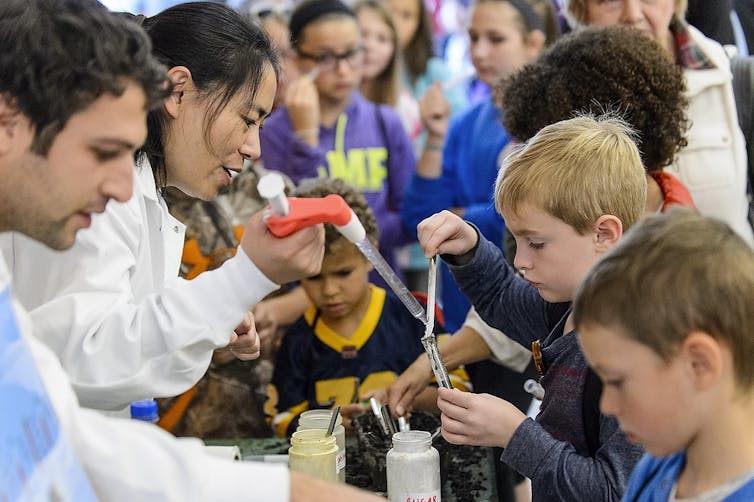Truth appears to be an more and more flexible thought in politics. At the very least which is the effect the Oxford English Dictionary gave just lately, as it declared “post-truth” the 2016 Phrase of the 12 months. What takes place when conclusions are based mostly on deceptive or blatantly incorrect data? The answer is quite straightforward – our airplanes would be a lot less safe, our clinical treatment plans less efficient, our financial state a lot less competitive globally, and on and on.
Quite a few scientists and science communicators have grappled with disregard for, or inappropriate use of, scientific proof for many years – specifically all over contentious troubles like the will cause of worldwide warming, or the advantages of vaccinating young children. A extended debunked examine on back links amongst vaccinations and autism, for occasion, cost the researcher his healthcare license but proceeds to hold vaccination charges lessen than they should really be.
Only recently, having said that, have men and women begun to think systematically about what in fact operates to boost better public discourse and selection-generating close to what is occasionally controversial science. Of system researchers would like to rely on evidence, produced by study, to achieve insights into how to most correctly express to other individuals what they know and do.
As it turns out, the science on how to best talk science throughout diverse concerns, social configurations and audiences has not led to quick-to-observe, concrete tips.
About a 12 months back, the Countrywide Academies of Sciences, Engineering and Drugs brought jointly a diverse team of experts and practitioners to handle this hole concerning investigation and observe. The purpose was to use scientific pondering to the procedure of how we go about communicating science proficiently. Both of those of us were being a component of this team (with Dietram as the vice chair).
The general public draft of the group’s conclusions – “Communicating Science Proficiently: A Exploration Agenda” – has just been posted. In it, we get a tricky seem at what helpful science conversation means and why it is crucial what can make it so tough – specially wherever the science is uncertain or contested and how researchers and science communicators can boost our expertise of what operates, and below what disorders.

Bryce Richter / UW-Madison
Evidence for successful strategies
As we found out, powerful science communication – such as listening to and participating with audiences – is notably advanced, and far from basic to examine. It is really dependent on what is being communicated, its relevance to who’s participating in the conversation and the social and media dynamic all over the troubles being tackled (in particular if those people issues or their coverage implications are contentious). But it also depends on what people truly feel and consider is right and the societal or political contexts inside of which interaction and engagement manifest. And this helps make obtaining it appropriate and deriving classes that can be used across difficulties and contexts specifically complicated.
For the reason that of this complexity, the exercise of science conversation (and there are a lot of good practitioners) is at this time more of an art than a science. Fantastic communicators – whether reporters, bloggers, experts or folks lively on social media and platforms like YouTube – typically understand from others, or by means of expert training, and generally by means of trial and error. Regrettably, the social sciences haven’t supplied science communicators with concrete, proof-primarily based assistance on how to talk extra effectively.
Two previously NAS conferences determined how assorted the areas of expertise are when it arrives to exploration on science conversation. Study spans behavioral economics and sociology alongside with media and interaction scientific studies. They also started to map out what we do and do not know about what works.
For occasion, it’s getting to be significantly distinct that the “deficit model” of science communication – the assumption that if we just “fill folks up” with science information and knowledge, they’ll come to be more and more rational determination-makers – just does not operate. This is not simply because folks are irrational fairly, we all have our own designed-in psychologies of how we make perception of details, and how we weigh different variables when creating conclusions.
We also know all of us are predisposed to acknowledge, reject or interpret information and facts based on a myriad of mental shortcuts, which includes a tendency to acquire on facial area benefit info that seems to verify our worldview.
And we know how info is presented, or framed, can have a profound influence on how it is interpreted and employed. The electrical power of the “Frankenfood” body, for illustration, utilized with genetically modified foods, has very little to do with offering new information. As an alternative, the term subconsciously connects genetically modified organisms to psychological principles we all share – worrisome suggestions about scientists generating unnatural organisms with unintended penalties – and raises ethical inquiries about science going way too significantly.

Waiting place picture by using www.shutterstock.com.
Conclusions variable in additional than facts
Science interaction may well contain speaking scientific consensus about, for occasion, the gains and risks of vaccines to individuals. Or it may possibly encompass considerably broader societal debates about the moral, ethical or political issues raised by science.
For example, our capacity to edit the genetic code of organisms is producing at breakneck velocity. Above the future 10 years, CRISPR and similar technologies will have a profound effect on our lives, from how we modify plants and animals and command disorder, to how we produce our food, and even how we improve our own genetic code as human beings.
But it will also current all of us with issues that can’t be answered with science on your own. What does it indicate to be human, for instance? Is it ethical to edit the genome of unborn embryos? If individuals included in people selections really don’t have the prospect to grasp the evidence-educated implications of the technology and make knowledgeable possibilities about its progress and use, the upcoming results in being minor extra than a lottery.
For those people communicating the science, then, the endeavor arrives with some degree of duty. Even selecting what information to share, and how to share it, involves personalized values, beliefs and perspectives, and can possibly have significantly-reaching penalties.
There’s an in particular high amount of ethical obligation involved with interaction intended to impact viewpoints, actions and steps. Researchers are nicely outfitted to document the general public health hazards of lowered vaccination fees, for case in point. The dilemma of whether we should really mandate vaccinations or take away belief-centered exemptions, however, is an inherently political one particular that scientists alone cannot response.
Mapping out a superior way
At some level, all science communication has embedded values. Info usually will come wrapped in a advanced skein of reason and intent – even when offered as impartial scientific facts. Irrespective of, or maybe because of, this complexity, there stays a require to acquire a more robust empirical foundation for powerful conversation of and about science.
Addressing this, the Countrywide Academies draft report tends to make an in depth amount of recommendations. A several in distinct stand out:
- Use a methods method to tutorial science conversation. In other words, realize that science conversation is component of a larger community of information and facts and influences that impact what people and businesses feel and do.
- Assess the success of science conversation. Of course, researchers try, but normally we even now have interaction in interaction to start with and assess later on. Much better to style the very best technique to interaction centered on empirical insights about each audiences and contexts. Very often, the complex hazard that experts consider should be communicated have nothing to do with the hopes or fears community audiences have.
- Get greater at meaningful engagement involving experts and other individuals to empower that “honest, bidirectional dialogue” about the claims and pitfalls of science that our committee chair Alan Leshner and other people have known as for.
- Contemplate social media’s influence – optimistic and adverse.
- Work towards much better understanding when and how to connect science all-around concerns that are contentious, or most likely so.
Addressing these and other locations is heading to consider concentrated analysis attempts that draw on knowledge throughout several various parts. It’s likely to need to have strategic and serious expenditure in the “science” of science conversation. It will also need much better engagement and collaboration concerning people who study science communication and individuals who essentially do it. And it’ll involve critical considering about why we communicate science, and how we can function respectfully with audiences to be certain that the science we do communicate about is of price to culture.
This will not be straightforward. But the choice – slipping further more into a write-up-real truth globe wherever disdain for proof creates threats that could be prevented – offers us very little possibility but to dig deeper into the science of science interaction, so that science and proof are far more effectively included into the selections people make.
